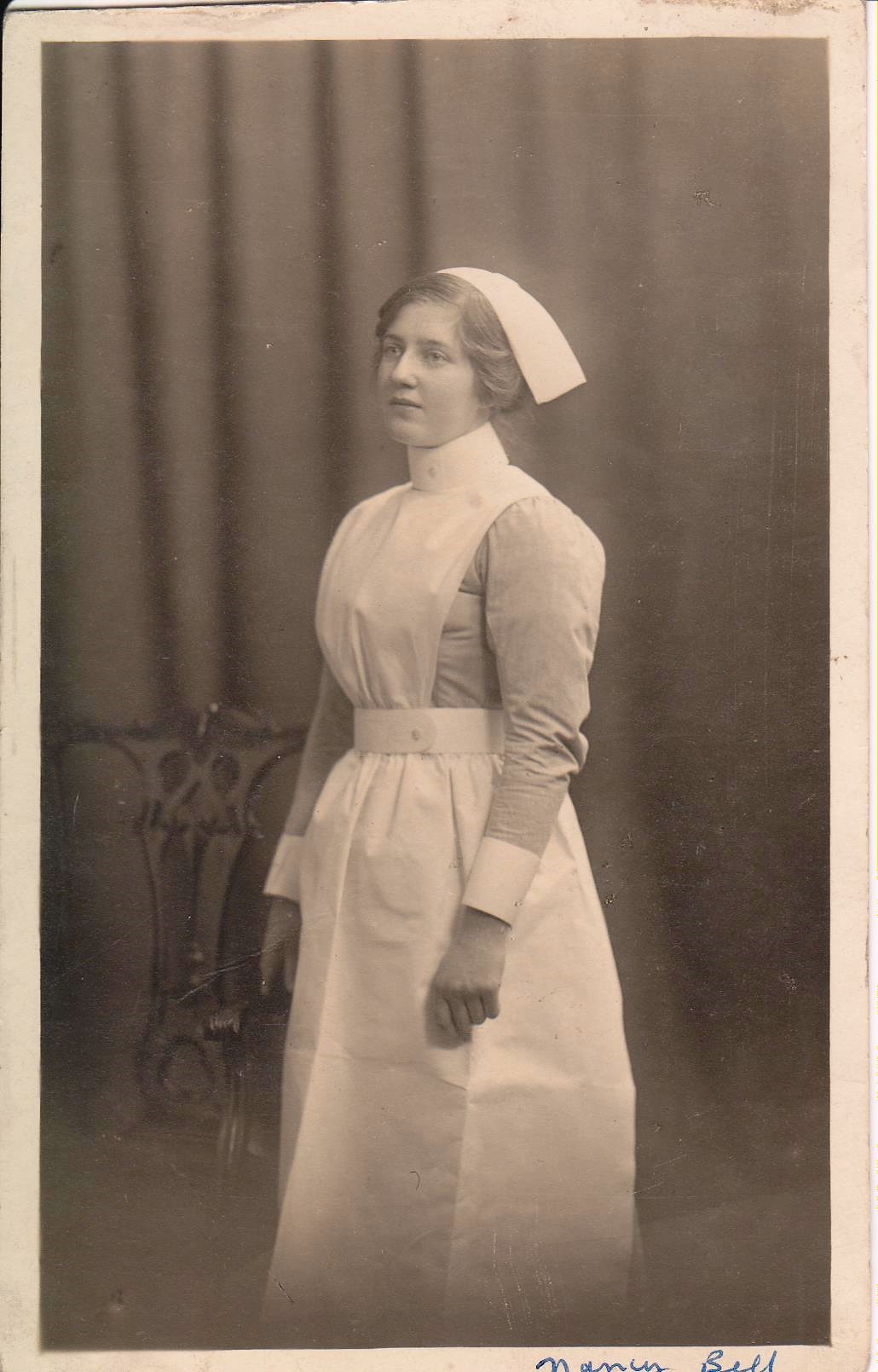
Story submitted by Mrs Drury, a resident of Richmond.
Nancy Bainbridge was born in Weardale, County Durham in May 1894. She was one of eight children whose parents were hardy hill farmers. Nancy was a very practical person and joined Queen Alexandra’s Imperial Military Nursing Service in 1914.
Nancy served at a military hospital in East Anglia where the nurses received casualties straight from the Somme. Her upbringing on a farm had afforded her some preparation for the ensuing, distressing sights and sounds. She described how the men arrived with mud and tufts of grass in their wounds. The nurses found out the hard way that soldiers’ skin, subjected to the mustard gas attacks in the trenches, could not be washed with water as that inflicted pain. Nancy received many deathbed requests.
After the war Nancy worked as a private nurse in families with disabled soldiers and patients with other conditions. She married Captain Jack (John Adam) Bell.
Nancy had a brother William, also a hill farmer and ten years older. He joined the Northumberland Fusiliers, but saw little service because, when detailed to chop an officer some sticks, a splinter blinded him in one eye.
Another sibling, Violet, worked in Barnard Castle’s recruiting office. Her soldier husband Harry Raine was awarded the Military Cross. The medal was presented to the Bowes Museum, Barnard Castle.

Explore more memories from the ribbon
-
Thomas Ginger
Lieutenant Thomas Ginger. Signals Officer. 4th Battalion. Thomas Ginger was awarded the Military Cross as a result of his bravery during the German ‘Spring Offensive’ of March 1918. In the citation for his award it describes how ‘On the first day his senior Officers were killed and in numerous rear-guard actions he found himself in command of considerable bodies of men’. One such example is during the retreat across the River Somme near Brie, when Ginger was ordered to take his men and cover the retreat of the remains of the 50th Division. He took his tired men to the far bank and took up positions to hold the advancing Germans back. At the same Lt George Begg, 239/Field Company was wiring the bridge that the retreating men were crossing. As German troops started to appear on the horizon and the last of the Durham Light Infantry crossed the bridge, Begg primed the detonator and pressed the plunger home. Nothing happened. This was repreated three times. When the bridge did blow, Begg looked across the river to see Ginger and his men still focusing fire on their foe. Eventually Ginger managed to construct a rudimentary footbridge, allowing his men to cross to safety.
-
Edward Barker
Edward was the Great Uncle of Robert Raw and Margaret Hird, who visited the museum during one of our Ribbon of Remembrance drop-in days. Edward, born in Richmond (he lived for at time along Frenchgate and then at 3 Maison Dieu) worked as a plumber for the North Eastern Railway, and enlisted after the outbreak of war in York. He became a Private in the 17th (Service) Battalion (NER Pioneers), a group whose skills were vital in constructing and maintaining the railways that developed behind the lines which kept the troops equiped and fed for the duration of the war. Edward was killed on 2nd November 1917, during the period where the battalion were working on light railways in the Ypres sector and suffered from shrapnel and gas shelling as well as high-explosives. Edward Barker is buried in Bard Cottage Cemetery, Belgium.
-
Arthur Bateman
Submitted by Rachel Blenkinsop. Arthur Bateman (Rachel’s maternal grandfather) served with the Royal Army Medical Corps. The photograph of him with his peers shows that he qualified as a Signaller (seated in the centre of the group – a crossed flag badge on his left sleeve is evidence of his Signals qualification). He was based in Boulogne at the 83rd (Dublin) General Hospital. In addition to its role as a general hospital, the 83rd had three specialist units treating facial injuries, eye injuries and had a ‘physical medicine’ or rehabilitation unit established by the Red Cross. Electric shock treatment was used at the hospital – this was often seen as a way of attempting to treat the symptoms of shell shock, but was also used when trying to allieviate problems with limbs. In a handwritten poem by one of the patients, both the electric shock treatment and also Arthur Bateman’s artistic ability are drawn to the fore. The 83rd General Hospital was moved from Boulogne at the end of the conflict, but was re-established in the Rhur (part of the area occupied by Allied troops following the Armistice). Arthur’s photo album shows that he too was relocated to Langenfeld to help care for the men of the army of occupation. Phyllis Cawthra, who became Mrs Bateman in 1923 caught the Spanish ‘flu at the end of the war. While she survived, the infection caused her to suffer from deafness…
